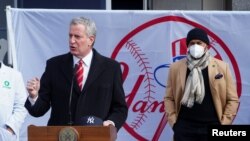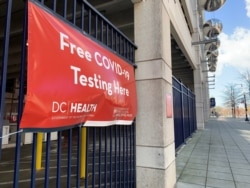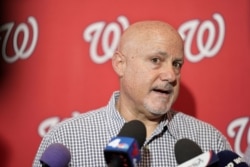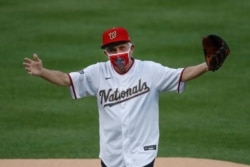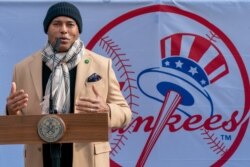One year after COVID-19 disrupted many professional sports, athletic competitions are resuming, including Thursday’s start of the North American Major League Baseball season.
Some teams are helping their communities get vaccinated as some spectators are allowed to return to stadiums and arenas.
“I’m happy to have gotten vaccinated at my team’s ballpark,” Laurence Hall, a Washington Nationals fan, told VOA. “I hope to attend a baseball game soon.”
Not a single paying spectator was allowed to attend any Major League Baseball games in last year’s abbreviated 60-game schedule. Hall is among millions of sports fans looking forward to returning to arenas and stadiums in person.
Sports franchises are banking on that enthusiasm to help propel vaccination efforts. Hall was among hundreds of people who came to a mass vaccination site inside the Nationals baseball stadium. It’s one of more than a dozen stadiums that have been used to get COVID-19 vaccine shots into people’s arms.
Numerous sports franchises are backing the initiatives, some launching their own vaccine outreach efforts in local communities while mapping out a safe return for players and fans.
Even as the sporting world dreams of life returning to normal, unwelcome reminders of the pandemic remain. The Washington Nationals abruptly postponed Thursday’s season-opening game and later two weekend contests after three players tested positive for COVID-19. The nationally televised contest with the New York Mets is due to be rescheduled but officials are scrambling to control the outbreak.
“This is a serious business,” said Washington Nationals general manager Mike Rizzo in a video conference call.
“The entire Nationals team is under mandated quarantine until we get this thing figured out,” Rizzo said. “It’s about people’s health and I’m not sure when our team will be cleared to play their first game.”
The postponement highlights the complexities of trying to resume team sports with fans in the stands as many U.S. states experience a new rise in coronavirus cases and prepare for the possibility of future infection spikes.
“When you're talking about stadiums outdoor[s], that's obviously an easier thing to get going rather than spectator sports indoors,” said Dr. Anthony Fauci, the director of the National Institute of Allergy and Infectious Diseases.
Dr. Fauci remains optimistic about fans returning in person to watch games.
“Maybe as we get into the summer, you're going to see a progressive increase in the capability of getting people in the stadium stands,” Fauci recently told CBS. “Maybe not full capacity right away, but certainly more than what we saw last year and less restrictions.”
As coronavirus restrictions ease in many states, professional baseball launched a full 162-game season. Twenty-six teams competed on opening day, but spectator access varied depending on local and state health regulations.
The New York Mets are allowing fans to attend games as long as they provide proof of a vaccine or test negative for COVID-19. Other health and safety measures including temperature checks, mask-wearing and social distancing will also be enforced for fans during the game.
“I think a year from now, we'll be back to pre-pandemic numbers [in the stands],” said Bob Dorfman, a sports marketing expert in San Francisco. “A percentage of fans will stay home, especially as the in-home viewing experience continues to improve, but I think they'll be replaced by new fans who want that live excitement.”
The Texas Rangers will be the first sports franchise in the United States to make full unrestricted seating available to fans since the onset of the pandemic. Having lifted all COVID-19 restrictions, the state is allowing the team to open seating for more than 40,000 fans despite warnings from U.S. health officials that a packed stadium will allow unchecked coronavirus transmission.
A public opinion survey by The Washington Post and University of Maryland found fewer than half of Americans say they would feel comfortable attending a live sporting event.
Teams, athletes join vaccine outreach
The New York Yankees and the Seattle Mariners are among several baseball franchises encouraging vaccinations in the cities and communities where they play. Some are enlisting heralded stars of yesteryear to lend a hand.
“This is greater than baseball,” said Hall of Fame former New York Yankees pitcher Mariano Rivera, one of the greatest relievers in the history of the game. “I walk around to people who were getting the vaccine, and I see so many smiling faces. Hope is the name of the game right now.”
The Mariners donated $2 million to help COVID-19 vaccines reach underserved communities.
“Being African American, being 60 years of age, I will definitely get the vaccine,” said former Mariners first baseman Alvin Davis in a video promoting vaccination in urban and minority communities. “Let’s strike out COVID-19.”
“These programs aim to raise awareness for the safety and importance of the vaccine and make the vaccine easily accessible, particularly in those communities that have been disproportionately affected by the pandemic,” said the Mariners organization in a statement.
Earlier this year the NBA launched a series of public service announcements with high-profile former players to encourage people to get vaccinated. It comes as some current African American players expressed apprehensions about receiving the vaccine.
“Any vaccine campaign using celebrities should aim to create a shareable and engaging message that explains the science of the vaccine and addresses concerns people hold,” said Detroit Pistons basketball player Blake Griffin.
Researchers say prominent sports figures urging vaccination could boost inoculation rates, especially in the Black community.
“I can see celebrity sports figures playing a very constructive role with vaccine hesitancy,” said Harvey Fineberg, a former dean of Harvard’s School of Public Health. “I could imagine more campaigns that enlisted professional sports athletes. One tagline could be: When it’s your turn, take a shot and let’s get everyone back in the game.”




